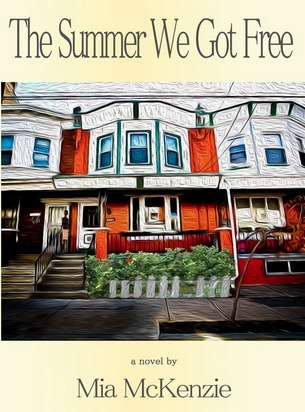The Summer We Got Free is Mia McKenzie‘s first novel and I was honored to be asked to write a blurb for the back. I wrote:
Mia McKenzie’s The Summer We Got Free answers Toni Cade Bambara’s question “do you want to be well?” with it’s own. Do you remember what I was like when I was? The novel won’t let you go as it surges forward with truth only fiction can tell. I was eager for answers as I followed a trail of not bread crumbs but whole pieces of toast slathered in butter that makes you moan or as I did, read passages aloud and neglect sleep for want of the next savory morsel. The Summer We Got Free is the product of a girl child grown up in the stories of June, Alice, Zora, Pearl, Gloria, and even Octavia, told in palimpsestic time where McKenzie’s own life doesn’t overlap with her characters but it doesn’t even matter. Ava is the black girl who reminds us that we are the ones we’ve been waiting for, to the delight of some and the displeasure of others. McKenzie’s masterful weaving of narrative belies an inaugural effort yet it is clearly an afrofuturistic vision of healing transformation and an affirmation that we have what we need. The text is saturated with an effortless queerity and a brush of magical realism that show what’s possible when you focus off center. I’ll be thrusting this into the hands of everyone I know as I return to it myself to remember I can get free again.
This interview with Mia McKenzie of Black Girl Dangerous is the first in a series of talks Crunk Feminists will have with people we think are creating the world we want to see. We do a lot of critique on the blog but in the new year we want to do more to highlight the folks who are doing the work of fostering activism and alternatives now! CF Crunktastic describes the project as a “Crunk Digital Salon.”
I mean salon both in the sense of the kind of intellectual gatherings that Madame CJ Walker and Georgia Douglas Johnson used to preside over in their homes during the Harlem Renaissance, but also in the sense of beauty/barber shop talk and politics, and the level of community, candor, everydayness and humor that one finds in those spaces.
CF Crunkonia characterizes it as a kitchen table.
I like the kitchen table for reasons involving my love for Paule Marshall. I also miss MHP’s old blog with the same name. And although the kitchen table may not mean to our generation what it did to Marshall’s foremothers, couldn’t we play with the whole digital age meets the kitchen thing because the kitchen table may double as an office desk for many of us? A play on women’s work?
CF Chanel reminded us that a cypher invokes our initial inspiration and connections to hip hop feminism.
I’m moved by the tumblr practice of Signal Boosting, of lifting up important messages that we want spread and that we want people to hear by reblogging them and asking others to do the same.
As we continue to work out what we call this thing, please enjoy our first offering. Get Crunk!!!


Yes!!!!!!!!
So much respect for her and for this piece. That is the best blurb on the back of a book I have ever read. I am literally salivating I can’t wait to read this book!!!
Thank you, Moya.